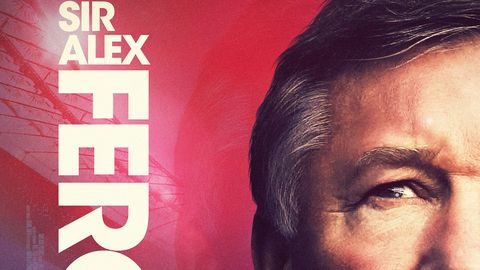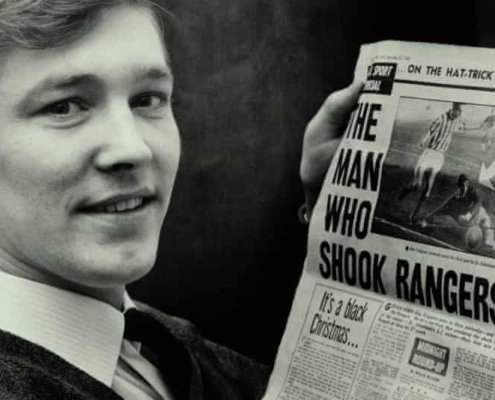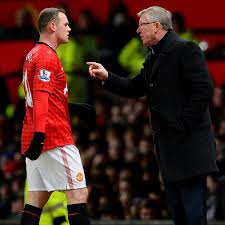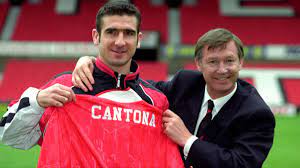Sir Alex Ferguson: Never Give In
Sir Alex Ferguson: Never Give In
For someone who considers myself a great learner, and a passionate coach, I’m somewhat embarrassed to say that up until now I knew little of Sir Alex Ferguson’s past. As an Arsenal fan in the 1990s I watched with envy how Manchester United would more often than not take the upper hand in the big games, and created somewhat of a fortress at Old Trafford. There was an intimidation factor that you saw in the players (Roy Keane comes to mind) and it started with the Manager.
So it was a pleasant surprise to find out that a new documentary was recently released about Sir Alex Ferguson. While recovering from a brain haemorrhage, Ferguson recounts details of his life and career to his son, including his legendary 26-year tenure as manager of Manchester United. This is a moving story about the bond between father and son, an exploration of leadership and mental toughness, and a celebration of one of football’s greatest careers.
Here was the dynamic young Glasgow socialist, who led a shipyard apprentices’ strike on Clydeside in 1961, then went into football, scored an unprecedented hat-trick for St Johnstone against Rangers at Ibrox, wound up playing for Rangers, then managing Aberdeen, then in 1986 was appointed manager of Manchester United and after a tricky start led them to all-conquering glory.
We are offered an intriguing “Rosebud” theory for the rage and passion that drove him. Ferguson was raised Protestant and his wife Cathy was Catholic; and on joining Glasgow’s famously Protestant Rangers FC as a player, Ferguson was sternly asked by one of the directors if he had got married in chapel. Meek for the one and only time in his life, Ferguson replied that it was in a register office – instead of telling him to mind his own business.
The Rangers bigwig declared himself satisfied.
Below are a few passages I took from the documentary.
”Me as a manager, I used to lie in bed thinking about themes that I could address the players with, that would make an impact on them. I would talk about miners, ship yard workers, welders, tool makers, people who have come from poor backgrounds, and I used to ask them, what did your grandfather do? What about your Dad? To get the feeling inside of them of what their grandfathers worked for, it’s part of them and they have to display that meaning.”
Taking away all the trophies I’ve won and all the great players I have worked with, it’s a fact of life that where we come from is important. You come out with an identity, I came from Govan, I’m a Govan boy.
”Everyone has their own personality, some walk away from things, and some say ‘No, I’m not going to accept this.’ When you grow up in a place like Govan most people were fighting to get out of there. Govan had the capitalist attitude to the working class, keep them down there, and I was lucky because the football was the saviour. Through that I got all the breaks. I progressed. My Dad played a part in that. He followed us everywhere and always encouraged us. Clubs approached my Dad. I wanted to play for Rangers FC but it was St Johnstone that signed me first. My Dad wouldn’t let me play full-time, I had to finish my apprenticeship first.’
I served an apprenticeship as a tool maker in case I didn’t make it as a footballer. I don’t think it did me any harm. It helped me in understanding people. The community. The apprenticeship strike was great for me. It wasn’t about you, it was about us, being part of a team. Nothing is more important than someone who has had hard times but is prepared to not give into it.”
”The thing that drove me was leaving Rangers, that spurred me. I started to question the managers, their way of managing. It gave me that impetus that I can do this job, I know I can do this job, simply because that’s my upbringing. Don’t give in.”
”Regarding my health I’m not actually in control. In the football world and at United I am in control of the situation. It is vital because a player can’t do it himself, a player is only part of a team. The manager is in control of all that destiny. Dealing with the press, referees, rivals, I have to make decisions that are correct. I was never a failure, I never looked back, because there was always tomorrow whether you lose or win.”
At Aberdeen, when interviewed by the press, ”Obviously I have my own ideas on standards, and through time this will come through to the players, fingers crossed.”
”Success was winning the league cup or the FA cup every six years. The problem was a lot of those players couldn’t dream of winning the league.” (implying when Sir Alex started working with them they didn’t have the belief in themselves they could beat Rangers and Celtic).
Alex was desperate to beat Rangers and Celtic. And Rangers was the first target. ”The first time we played at Rangers we scrambled a draw in the last minute. After the game all the players were all celebrating jumping up and down. And I’m saying, wait a minute, what you all celebrating for, you’ve only drawn?!”
Gordan Strachan said after the match, ”We’ve all had bollockings off managers at previous clubs but this was an intensity that was not just about that game, it was everything, where do you want to go what do you want to do with your life.”
Alex said, ”Forget all the work we’ve been doing on passing the ball, and technical ability, if they’re not winners, it’s a waste of time anyway. You’re trying to get that character instilled in the human beings you’re working with. When you go on that pitch you can’t leave your personality in the dressing room.”
Gordan said ”there is something up here, not right, there is something inside this fella that is making him angry and driving him and, looking back, it’s like I’ve bumped into a wounded animal.”
”Rather than explain how you can bring a winning mentality to people, you have to produce a project that is working. You have to earn the right to be an Aberdeen player.”
Gordan said, ”He put people under so much pressure to be successful. Deep down inside of us there is a devil that drives us on. For whatever reason, Alex could make that devil materialise for a game of football. He brought the devil out of me.”
”If you get them young enough and breed the important values of what you are trying to achieve with them they will become that particular person that you were looking for.”
Asked by a broadcaster about the class of 1992 (Beckham, Giggs, Scoles, Nevilles, Butt), ”Do you have to treat them differently to the established stars? ”
”Absolutely, you have to be harder on them because they are facing for the first time in their lives media attention, and you don’t get any criticism from journalists when you are young, it’s all praise. I think they realise that being strict on them is for their own good.”
”That fearsome character has been portrayed throughout my career, and absolutely, I may have gone a bit too far on some occasions but I don’t think there is anything wrong in losing your temper for the right reasons, if they didn’t meet your expectations in a game, because everything is built around the standards in training and the ambitions of the football club. Because my experience of human beings is they like to do things the easiest way. The minute you accept a bad performance or a bad aspect of their technical training they will do it again.”
Ryan Giggs, ”He was always in control, you were never in any doubt who was the boss.”
Alex said, ”I could be ferocious in terms of my criticism after the games, sometimes I would gather them altogether or sometimes I wouldn’t say a word to them. I would never make myself predictable.”
It wasn’t as if I was their best pal, but they always knew I would find a way to help them. You have to know them all, all these different people, with all these different stories.”
”When I met Eric [Cantona] I said to myself, right, I am going to forget his past, I’m not going to mention any of his behaviour. It didn’t matter, what mattered to me was what we could do to bring him into our fold and give him the opportunity to be himself.”
Ryan said, ”Eric was just treated differently.”
Cantona said, ”More than a manager he was somebody strong enough to deal with any kind of personality. But, when somebody like Sir Alex Ferguson gives you the freedom you need to express yourself you have to deserve it and you know how lucky you are to have this freedom and it’s why I worked so hard and I tried so hard and give everything to him.
Do you feel that this would be a perfect time to work on the weak links that you have been avoiding? The things that you know you should be doing that you keep putting off? Would you like us to help you with movement screening and an injury prevention program? Then click on the link below and let us help you!
 TRAIN WITH APA
TRAIN WITH APA 
Aspiring Pro Training Support Packages
Follow me on instagram @apacoachdaz
- If you’re not subscribed yet, click here to get free email updates, so we can stay in touch.
- Share this post using the buttons on the top and bottom of the post. As one of this blog’s first readers, I’m not just hoping you’ll tell your friends about it. I’m counting on it.
- Leave a comment, telling me where you’re struggling and how I can help
Since you’re here…
…we have a small favor to ask. APA aim to bring you compelling content from the world of sports science and coaching. We are devoted to making athletes fitter, faster and stronger so they can excel in sport. Please take a moment to share the articles on social media, engage the authors with questions and comments below, and link to articles when appropriate if you have a blog or participate on forums of related topics. — APA TEAM








